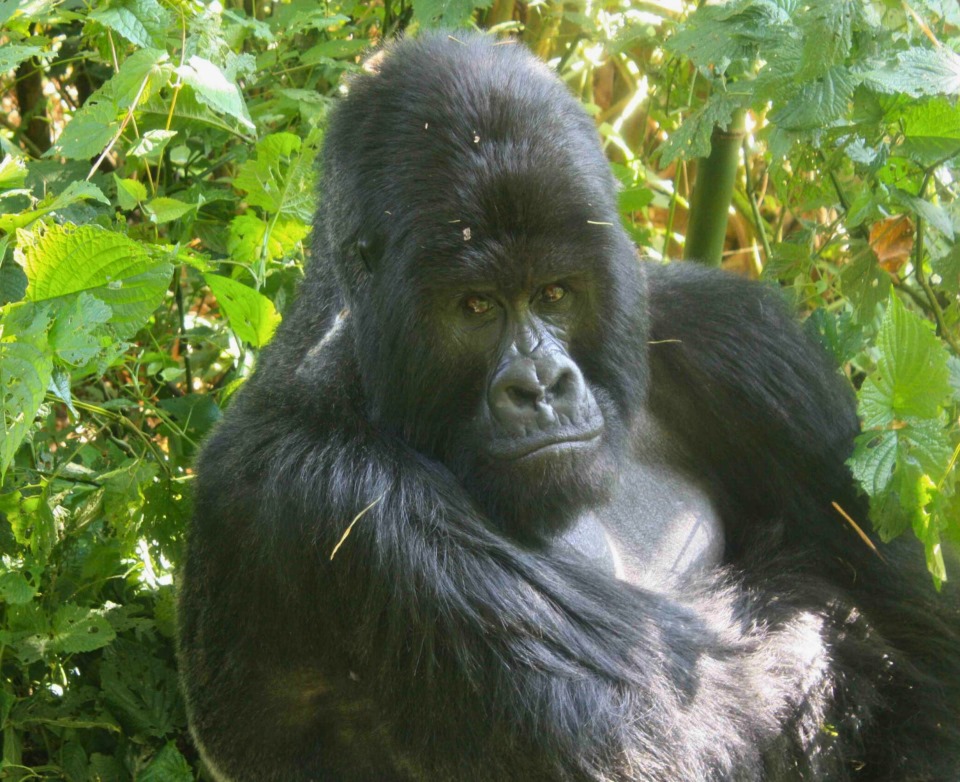Mountain Gorilla Patriarch Bukima Passes Away
General Inquiries
Tel:+254 711 063 000
Ngong Road, Karen, P.O. Box 310
00502 Nairobi, Kenya

The late Bukima, the once-dominant silverback of the Rugendo mountain gorilla troop
The African Wildlife Foundation (AWF) joins Virunga National Park (VNP) in mourning the loss of Bukima, the once-dominant silverback of the Rugendo mountain gorilla troop. Bukima succumbed to injuries on June 26 sustained in a fight with another silverback weeks earlier.
Despite heroic efforts by community trackers, led by Jacques Katutu, Head of Gorilla Monitoring for Virunga National Park, who intervened multiple times with antibiotics and other medications, Bukima's injuries proved fatal.
Born in 1992, Bukima's life embodied the resilience of the Virungas landscape. After losing his father, Buhanga, Bukima lived alone until 2009. This solitary period coincided with a dark time for the Virunga gorillas, marked by the 2008 massacre of five Rugendo family gorillas, including the dominant silverback, Senkwekwe, by armed militia in the Eastern DRC. The conflict also halted gorilla monitoring.
When monitoring resumed, rangers found the Rugendo family with two new mature silverbacks: Bukima and Pilipili. The two likely competed for control, with Pilipili eventually leaving in 2009. This left Bukima as the leader, guiding the Rugendo family through its recovery after the massacre.
In a statement published on the Virunga National Park website, Dr. Eddy Kambale Syaluha of Gorilla Doctors recounted a notable incident in 2017. During a critical rescue of a snared infant gorilla, Bukima, in an unusual display of trust, intervened to safeguard the veterinarians.
AWF’s Support of Mountain Gorillas
AWF's commitment to mountain gorilla conservation in the Virungas began in the early 1990s, when the organization partnered with others to address the declining gorilla population. This transboundary landscape, shared by the Democratic Republic of the Congo (DRC), Uganda, and Rwanda, is home to the world's mountain gorillas. These gorillas are found within Volcanoes National Park (Rwanda), Virunga National Park (DRC), and Bwindi Impenetrable Forest National Park (Uganda).
The AWF-led Mountain Gorilla Project focused on transboundary capacity-building, anti-poaching efforts, and public awareness. The project also played a crucial role in habituating gorillas to tourist groups and training rangers in innovative methods.
These combined efforts have yielded significant success. Over the past three decades, the mountain gorilla population has increased to over 1,004 individuals, improving their IUCN status from Critically Endangered to Endangered. However, growth rates vary among gorilla groups.
The increasing gorilla population presents a new challenge: securing enough habitat within the densely populated areas surrounding the parks. AWF recognizes the critical role local communities play in achieving this goal. Restoring gorilla habitat hinges on their support.
Today, AWF is working in collaboration with the Rwandan government, local communities, and other stakeholders to promote the long-term conservation of the landscape. The goal is to increase space for mountain gorillas in Volcanoes National Park while improving the livelihoods and resilience of the people living alongside these magnificent creatures.
AWF's Enduring Impact
Our current work is grounded in past contributions to Volcanoes National Park. In 2018, AWF expanded the park's size by donating a 27.8-hectare parcel of land, providing crucial space for these endangered creatures. Recently, AWF handed over the restored landscape to Volcanoes National Park management.
Other initiatives pioneered by AWF include the development of eco-tourism enterprises that facilitate local ownership, such as the Sabyinyo Silverback Lodge in Rwanda and Clouds Mountain Gorilla Lodge in Bwindi, Uganda. These lodges exemplify AWF's commitment to transforming local livelihoods and ensuring conservation benefits the people who share the environment with these remarkable creatures.